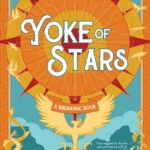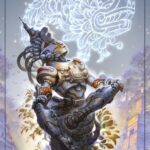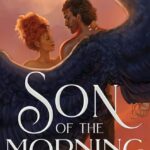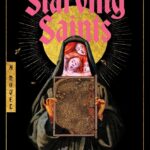
Genres: Queer Protagonists, Science Fantasy, Speculative Fiction
Representation: Latinx cast, biracial latina MC, nonbinary MCs
Published on: 14th September 2021
ISBN: 0063002892
Goodreads

David Mitchell’s Cloud Atlas meets Octavia Butler’s Earthseed series, as acclaimed author Monica Byrne (The Girl in the Road) spins a brilliant multigenerational saga spanning two thousand years, from the collapse of the ancient Maya to a far-future utopia on the brink of civil war.
The Actual Star takes readers on a journey over thousands of years and six continents —collapsing three separate timelines into one cave in the Belizean jungle.
An epic saga of three reincarnated souls, this novel demonstrates the entanglements of tradition and progress, sister and stranger, love and hate. The book jumps forward and backward in time among a pair of twins who ruled a Maya kingdom, a young American on a trip of self-discovery, and two dangerous charismatics in a conflict that will determine the fate of the few humans left on Earth after massive climate change.
In each era, age-old questions about existence and belonging and identity converge deep underground. Because only in complete darkness can one truly see the stars.
I received this book for free from the publisher via NetGalley in exchange for an honest review. This does not affect my opinion of the book or the content of my review.
Highlights
~in the future you can be a mermaid
~behind every myth is a normal person
~I guess that means we’re all myth-makers
This is not the kind of book I usually read – although I didn’t know that until I started reading it, and I might not have started if I’d known – and I have mixed feelings about it.
The first thing I think fans of SFF should know is that The Actual Star feels much more like literary fiction than it does fantasy or sci fi. I don’t think that’s the sort of thing that is good or bad, it just is, but it wasn’t what I was expecting or hoping for. That clash – of my expectations vs the reality of the book – is probably a big part of why I can’t say I’m a fan, but the biggest part is that I was incredibly bored.
The Actual Star covers three timelines: the last royal children of a Mayan kingdom in 1012, a biracial tourist getting entangled with twin brothers in 2012, and a philosophical and political schism taking place in a post-apocalyptic utopia in 3012. A massive amount of research has clearly gone into the 1012 plotline, which I really enjoyed and appreciated, and the thought and worldbuilding of the 3012 timeline just blew me away. If the entire book had been set in 3012, I’m pretty sure this would be a five star review, because the only thing I didn’t love about it was that we didn’t see more of it. Byrne has created a utopia like no other I’ve ever seen, utilising principles and concepts from all over the anti-capitalist spectrum and plenty of ideas that are wholly her own, and the result is mindblowing. Very, very strange and unexpected, but in a truly brilliant way.
But although the 1012 storyline was full of incredible attention to detail, there was nothing very compelling about the actual story – which is surprising, because on the face of it, ‘last children of a royal house seek to restore its former glory’ is a story that writes itself. The unfamiliar (to me) setting, culture, and mythos should have had me hooked; those are the kind of things I love. Historical or full-on fantasy, it doesn’t really matter so long as it’s different and detailed, and this was. But it also felt as though nothing was happening. The pacing was slow, the chapters introspective, the characters neither especially appealling nor interesting. There was no push to keep reading, except for my enjoyment of the beautiful details of the setting.
The 2012 storyline was even worse, and cured my insomnia on several occasions. Leah, a biracial 19 year old from the States, comes to Belize to explore the country her father came from. Her instant connection to the country, and particularly to Actun Tunichil Muknal, a cave system sacred to the Maya and now a major tourist attraction, is intense and, although she doesn’t know it, worldchanging. Her love for ATM brings her into contact with tour guides and twins Javier and Xavier, who have very different approaches to the cave, life, and Leah.
I don’t like reading about real people living their lives. I just don’t care. I tried so hard to feel something about Leah’s…’spiritual awakening’ doesn’t seem like the right term, but I don’t know what else to call it. Whatever you call it, I didn’t feel it. This was clearly a massive and life changing thing for her, but it didn’t touch me – maybe I’m just too cynical? – and although I really liked her as a character and person (and would love to stay up late talking about the meaning of life with her) I really disliked the twins and resented the chapters I had to spend in their heads. All three of them felt very much like real people, but…I just don’t enjoy stories about real people living in the real world. It felt so banal, most of it.
On another note, the 2012 storyline was also the one that reduced me to tears of frustration on a regular basis. Javier and Xavier often speak in Belize kriol when English-speaking Leah is not present, and that’s fine. What wasn’t fine, for me, was that no English translations were offerred, not even in footnotes. This meant that there were so many stretches of dialogue that I just didn’t understand. Some of it was just about understandable if you sounded out the phonetics, but lots of it wasn’t, and it made me want to throw the book across the room. It did make me cry. I’ve struggled with languages my whole life – I’ve studied Irish, German, French, Spanish, Latin, Finnish, and Swedish, and failed all of them – and this aspect of the book? Made me miserable. To a lesser extent, this was also a problem in the 3012 storyline, where Spanish is used as a ritual language.
It makes perfect sense for characters so speak their own languages. I always get twitchy when in movies, non-English characters speak English amongst themselves for the sake of the audience. But the best films show German-speakers speaking German…and include subtitles so I can still understand. The Actual Star does not include the equivalent of subtitles, and maybe I’m just stupid, but no, it often wasn’t clear from context what was being said. I cannot emphasise enough how much I hated that and how much it upset me.
I went into The Actual Star expecting to love it, and I’m still kind of confused as to how I didn’t. For the most part, I didn’t find anything poignant here. Reincarnation? I guess, but cutting that aspect from the story wouldn’t be much of a loss. Magic? No. Seriously impressive sci fi elements in the 3012 storyline, but you have to slog through the other two timelines to get to them. There’s some cool stuff about myth-building and how religions develop, but at the end of the day, I don’t know it this is a good (in the sense of well-written, well-crafted) book or not. I think there’s too much in the way for me to be able to judge it objectively. I can only tell you that I did not enjoy it, I found most of it a chore to read, and have to write it off as a massive disappointment.






Leave a Reply